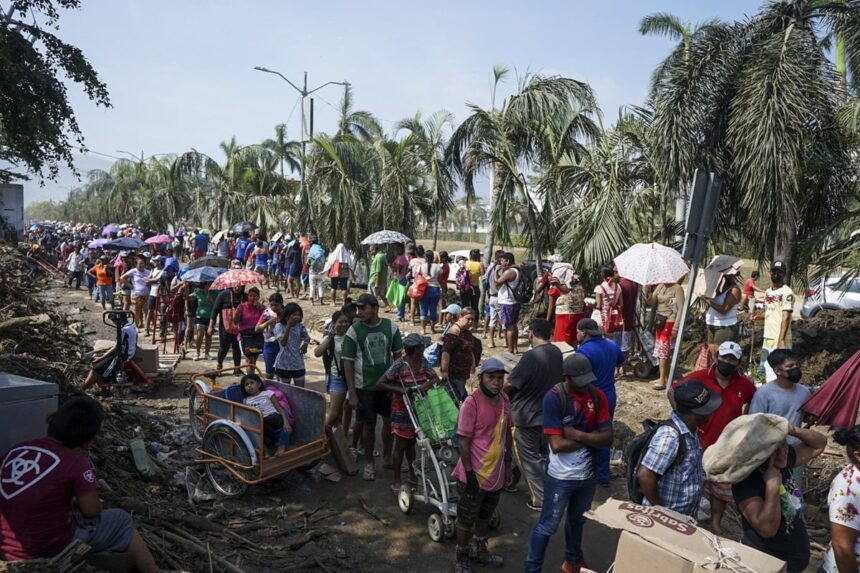“`html
As the 2024 UN Climate Change Conference approaches in Baku (COP29), the World Health Organization (WHO) emphasizes the urgent need to move away from fossil fuel dependency and promotes a focus on human-centered adaptation and resilience.
In conjunction with the release of the COP29 Special Report on Climate and Health and technical guidance for Healthy Nationally Determined Contributions, WHO calls upon global leaders attending COP29 to shift from isolated strategies towards a more integrated approach that encompasses both climate change and health. The organization highlights that prioritizing health in all climate-related negotiations, policies, strategies, and action plans is crucial for saving lives now and ensuring healthier futures for generations to come.
“The climate crisis represents a significant threat to public health. Therefore, placing health at the forefront of climate initiatives is not just an ethical obligation but also a strategic opportunity to unlock transformative benefits for public well-being,” stated Dr. Tedros Adhanom Ghebreyesus, Director-General of WHO. “COP29 presents an essential chance for world leaders to weave health considerations into their frameworks aimed at adapting to and mitigating climate change. WHO stands ready with practical guidelines and support for nations in this endeavor.”
The Case for Health-Centric Climate Action
The COP29 Special Report on Climate Change and Health, developed by WHO alongside over 100 organizations and 300 experts, pinpoints vital policies across three interconnected dimensions: people, place, and planet. This report outlines essential actions designed to safeguard all individuals—especially the approximately 3.6 billion people residing in regions most vulnerable to climate impacts.
A key takeaway from this report is that effective governance must integrate health into climate policy-making while simultaneously incorporating climatic factors into health policy-making as fundamental steps toward progress. The primary recommendations include:
- Establishing human health as the principal metric of success regarding climate initiatives; this will drive progress while ensuring adaptation efforts are centered around people’s needs.
- Abolishing fossil fuel subsidies by restructuring economic systems towards investments in clean energy alternatives that protect both public health and environmental integrity while reducing pollution-related illnesses.
- Securing funding specifically aimed at enhancing initiatives linking climate action with healthcare improvements—this includes bolstering responsive healthcare systems capable of weathering climatic challenges.
- Investing in proven interventions; implementing just five targeted measures—from heat-health warning systems to promoting clean household energy—could prevent nearly two million deaths annually while yielding $4 worth of benefits per dollar spent.
- Enhancing urban planning focused on sustainable design principles which promote better public health outcomes through improved sanitation services, resilient housing structures, clean energy sources, etc.
- Pursuing stronger protections for natural ecosystems along with biodiversity restoration efforts since these contribute significantly toward achieving cleaner air quality as well as food security.
“Health embodies our direct experience with climate change,” remarked Dr. Maria Neira, Director of Environment, Climate Change & Health at WHO. “By embedding health considerations within every facet of our response strategies against climatic shifts we can realize substantial advantages not only concerning public welfare but also regarding economic stability.”
The Expanded Role of WHO in Addressing Climate-Related Health Issues
NDCs or Nationally Determined Contributions represent national commitments made under international agreements like Paris Accord aimed at combating global warming issues globally. While 91% acknowledge healthcare priorities within their NDCs framework few delineate actionable steps necessary towards harnessing potential positive impacts stemming from mitigation/adaptation measures or safeguarding population wellness against adverse effects linked directly back onto changing climates themselves!
To assist countries better incorporate healthcare aspects into their respective environmental policies moving forward today marks release date concerning WHO Quality Criteria For Integrating Healthcare Into Nationally Determined Contributions – Healthy NDCs! This guidance provides actionable insights tailored specifically targeting ministries responsible overseeing areas such transport/energy/urban planning/water/sanitation sectors enabling them effectively embed relevant considerations throughout adaptation/mitigation agendas alike!
This technical framework serves as an implementation guide addressing critical domains including leadership roles/enabling environments/national circumstances/policy priorities/methodologies surrounding loss/damage financing mechanisms alongside execution processes overall! By integrating these elements together we can:
- Tackle diverse impacts: Address various ways through which changing climates affect human wellbeing;
- Create robust infrastructures: Enhance resilience capabilities within existing medical frameworks whilst pursuing decarbonization pathways;
- Pursue synergistic advantages: Focus attention upon key sectors wielding considerable influence over both improving population wellness & facilitating effective responses against ongoing threats posed by shifting weather patterns such transportation/electricity generation methods etc..
Endorsements From Key Figures In Support Of These Initiatives
António Guterres , Secretary-General United Nations :
“Climate crises equate directly back down onto matters relating closely tied up around maintaining healthy populations! Nations must undertake meaningful actions protecting citizens boosting resources cutting emissions phasing out reliance upon fossil fuels ultimately reconciling relationships established between humanity nature itself! COP29 should propel advancements towards achieving those pivotal objectives benefiting planetary wellbeing alongside individual livelihoods!”
Dr Rajiv J Shah , President Rockefeller Foundation :
“The ramifications associated surrounding ongoing changes occurring due primarily due rising temperatures cannot solely be quantified merely degrees Celsius instead they require accounting lives saved lost improved overall quality living conditions experienced too! Our foundation collaborates closely working hand-in-hand alongside organizations like World Health Organization focusing heavily centering discussions revolving around integrating holistic views encompassing entire spectrum related topics including equitable transitions fostering economic opportunities especially frontline communities affected most severely!”
Dr Vanessa Kerry , Special Envoy For Climate Change & Public Health At WHO :
“This report reveals how accelerating crises intertwining between environment/public welfare extend far beyond mere physical ailments—they undermine economies exacerbate inequalities incite political unrest too! As decision-makers gather together during upcoming sessions held throughout COP29 we implore them expedite transitions ensuring adequate funding directed straight toward bolstering local medical infrastructures safeguarding vulnerable populations everywhere possible because without prioritizing these aspects future remains uncertain!”
Dr Alan Dangour , Director Of Wellcome Trust’s Program On Environmental Sustainability And Human Welfare :
“Every single nation faces consequences arising out current trajectory leading us down path destruction costing countless lives inflicting immense suffering across globe alike—we share common responsibility uniting forces acting swiftly before it becomes irreversible situation confronting us head-on during forthcoming conference where commitments made should reflect ambitious cross-sectoral approaches protecting planet improving overall community wellness simultaneously!”
Dr Micaela Serafini , President Médecins Sans Frontières (MSF) Switzerland :
“We find ourselves entrenched within unacceptable reality wherein world’s most marginalized groups bear brunt consequences stemming largely problems they never instigated themselves hence solutions prioritizing safeguarding their rights must take precedence placing emphasis firmly rooted around enhancing collective wellbeing amidst ongoing struggles faced daily otherwise risks jeopardizing very essence humanity itself!”
Jagan Chapagain , Secretary General International Federation Red Cross Red Crescent Societies (IFRC):
“From extreme heat waves triggering illness outbreaks flooding events leading malnutrition crop failures resulting new disease vectors emerging previously unseen territories—the overarching narrative remains clear—the current state affairs constitutes ultimate challenge confronting modern society today requiring immediate attention highlighted via findings presented herein underscoring necessity taking decisive actions moving forward!”
Source.
“`





